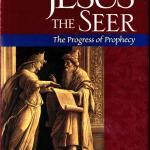By T
I was fascinated, encouraged, excited and even a bit nervous as I read a recent post by another Patheos blogger and Christian scholar, Roger Olson. Yes, that’s quite a range of emotions for one blog post, but in many ways, Roger was telling my own theological story, and the story of many others, I suspect, in identifying a recent development in Christian theology that was, in his words, “new . . . even if not entirely novel.” Roger is uniquely positioned to identify such shifts because at least one of his areas of scholarship is the history and development of Christian theology itself (e.g., his 2000 award winning book, The Story of Christian Theology)
So what is this new but not new “paradigm shift” anyway? In Roger’s words:
Jesus is the perfect revelation of the character of God . . . traced out to its logical conclusion and not left as a mere notion that does not permeate the whole body of belief. . . .
My argument is that many evangelical Christians have always believed this principle in principle but have not worked it into their theology systematically. . . .
My point is simply this: This paradigm shift in modern, contemporary Christian theology toward thinking through logically and without restraint the principle that Jesus is the perfect revelation of the character of God has precursors and profound implications.
What we’re really working out, in terms of our theology, are the implications and range of Christ’s supremacy as the revelation of the Father. The question as to how far and how profound we allow his supremacy to be in our theology is not for the feint of heart, and any easy answers are bound to only gloss over serious concerns. I’m reminded of a common dynamic in the New Testament in which Christ is often portrayed as “greater” or as having more authority than even the greats that preceded him. Not only is he “greater” than John the Baptist (who Christ says is greater than any man ever born), but he is “greater” than or as having authority over Solomon, Jacob, Jonah, David, the Temple, Israel, the Church, sin, death, life, the wind and waves and all creation: heaven and earth, with a name above every name. What exactly do we mean by embracing these statements of superiority?And I’m particularly reminded of this event with pointed paradigmatic implications for theology: the conversations at the transfiguration.
After six days Jesus took with him Peter, James and John the brother of James, and led them up a high mountain by themselves. There he was transfigured before them. His face shone like the sun, and his clothes became as white as the light. Just then there appeared before them Moses and Elijah, talking with Jesus. Peter said to Jesus, “Lord, it is good for us to be here. If you wish, I will put up three shelters—one for you, one for Moses and one for Elijah.” While he was still speaking, a bright cloud covered them, and a voice from the cloud said, “This is my Son, whom I love; with him I am well pleased. Listen to him!” When the disciples heard this, they fell facedown to the ground, terrified. But Jesus came and touched them. “Get up,” he said. “Don’t be afraid.” When they looked up, they saw no one except Jesus.
I find that story fascinating. I feel even a little shaken reading it. But what is the Father saying in his dramatic interruption of Peter and directing sole focus on Jesus, even as he stands next to Moses and Elijah? Jesus leads them up a mountain, and suddenly the disciples see, in real time, his face shining like the sun, his clothes made pure white by the transforming light, and as their eyes recover from the bright light, they see Jesus talking with Moses and Elijah, the human representatives of the Law and the Prophets. And Peter does what any good Jew would do (or any good Christian?) and offers to honor all three. But the Father literally interrupts Peter in his proposal. And in this context, affirms Jesus and singles him out for attention:” This is my Son, whom I love; with him I’m well pleased. Listen to him!” As we assess the historic and present systematics of Christian theology, as we look at our own lives and faith, the question needs to be asked,
“Have we? Have we listened to him above all others? How Christ-like is Christianity?”
Have we listened, do we listen to Jesus in the way the Father clearly prioritizes? How “supreme” is Jesus in our theology and doctrine? Is he the cornerstone, in the way that cornerstone’s function, to measure and guide and correct the building of the whole building by it’s trustworthy dimensions? Do we hold Jesus’ character and teachings in such a way so that such are “traced out to [their] logical conclusion[s]?” Do Jesus’ character and his teachings “permeate the whole body of [our] belief” or do we simply hold him, side by side, with Paul, Moses, Elijah and other ordained voices?
What I see at stake is manifold, including such small things as (i) our many approaches to and theories for the scriptures, (ii) our many theories of ethics, (iii) our understanding of the content of the gospel, (iv) and, perhaps most importantly (!) our priorities both of practice and doctrine which often actually serve as the real “cornerstones” for how entire persons, families, churches and denominations are built.
Have you seen this trend in scholarship? In popular level works? In church life? Where and how? Do you see this as overdue and necessary? As dangerous? Both? Where and how does Christianity need more of Christ? Next time we’ll get into some particular voices and examples I’ve seen and press into some specific ways I hope this movement continues to press on.
















